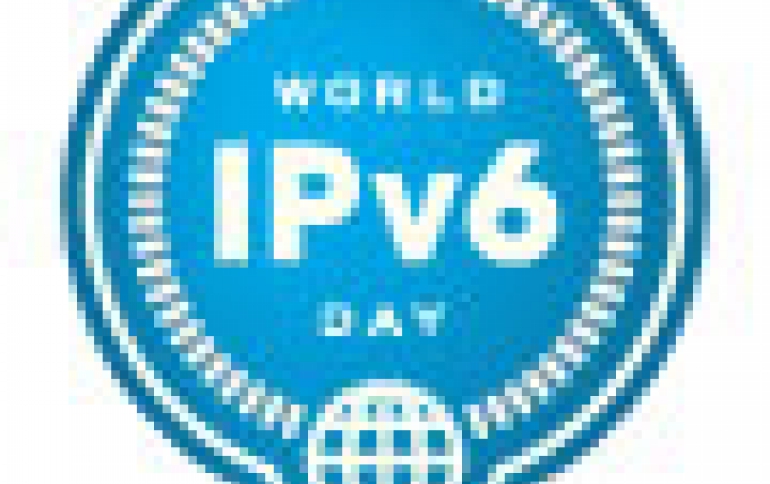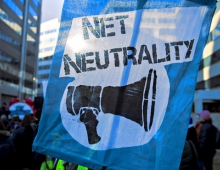
World IPv6 Launch Scheduled For June
Major Internet service providers (ISPs), home
networking equipment manufacturers, and web companies
around the world are coming together to permanently
enable IPv6 for their products and services by 6 June
2012.
Organized by the Internet Society, and building on the
one-day World IPv6 Day event held on 8 June 2011,
World IPv6 Launch represents a major milestone in the
global deployment of IPv6. As the successor to the
current Internet Protocol, IPv4, IPv6 is critical to
the Internet's continued growth as a platform for
innovation and economic development.
"The fact that leading companies across several industries are making significant commitments to participate in World IPv6 Launch is yet another indication that IPv6 is no longer a lab experiment; it's here and is an important next step in the Internet's evolution," commented Leslie Daigle, the Internet Society's Chief Internet Technology Officer. "And, as there are more IPv6 services, it becomes increasingly important for companies to accelerate their own deployment plans."
ISPs participating in World IPv6 Launch will enable IPv6 for enough users so that at least 1% of their wireline residential subscribers who visit participating websites will do so using IPv6 by 6 June 2012. These ISPs have committed that IPv6 will be available automatically as the normal course of business for a significant portion of their subscribers. Committed ISPs are:
AT&T
Comcast
Free Telecom
Internode
KDDI
Time Warner Cable
XS4ALL
Participating home networking equipment manufacturers will enable IPv6 by default through the range of their home router products by 6 June 2012. Committed equipment manufacturers are:
Cisco
D-Link
Web companies participating in World IPv6 Launch will enable IPv6 on their main websites permanently beginning 6 June 2012. Inaugural participants are:
Facebook (www.facebook.com)
Google (www.google.com)
Microsoft Bing (www.bing.com)
Yahoo! (www.yahoo.com)
Content delivery network providers Akamai and Limelight will be enabling their customers to join this list of participating websites by enabling IPv6 throughout their infrastructure.
IPv4 has approximately four billion IP addresses (the sequence of numbers assigned to each Internet-connected device). The explosion in the number of people, devices, and web services on the Internet means that IPv4 is running out of space. IPv6, the next-generation Internet protocol which provides more than 340 trillion, trillion, trillion addresses, will connect the billions of people not connected today and will help ensure the Internet can continue its current growth rate indefinitely.
"The fact that leading companies across several industries are making significant commitments to participate in World IPv6 Launch is yet another indication that IPv6 is no longer a lab experiment; it's here and is an important next step in the Internet's evolution," commented Leslie Daigle, the Internet Society's Chief Internet Technology Officer. "And, as there are more IPv6 services, it becomes increasingly important for companies to accelerate their own deployment plans."
ISPs participating in World IPv6 Launch will enable IPv6 for enough users so that at least 1% of their wireline residential subscribers who visit participating websites will do so using IPv6 by 6 June 2012. These ISPs have committed that IPv6 will be available automatically as the normal course of business for a significant portion of their subscribers. Committed ISPs are:
AT&T
Comcast
Free Telecom
Internode
KDDI
Time Warner Cable
XS4ALL
Participating home networking equipment manufacturers will enable IPv6 by default through the range of their home router products by 6 June 2012. Committed equipment manufacturers are:
Cisco
D-Link
Web companies participating in World IPv6 Launch will enable IPv6 on their main websites permanently beginning 6 June 2012. Inaugural participants are:
Facebook (www.facebook.com)
Google (www.google.com)
Microsoft Bing (www.bing.com)
Yahoo! (www.yahoo.com)
Content delivery network providers Akamai and Limelight will be enabling their customers to join this list of participating websites by enabling IPv6 throughout their infrastructure.
IPv4 has approximately four billion IP addresses (the sequence of numbers assigned to each Internet-connected device). The explosion in the number of people, devices, and web services on the Internet means that IPv4 is running out of space. IPv6, the next-generation Internet protocol which provides more than 340 trillion, trillion, trillion addresses, will connect the billions of people not connected today and will help ensure the Internet can continue its current growth rate indefinitely.





















